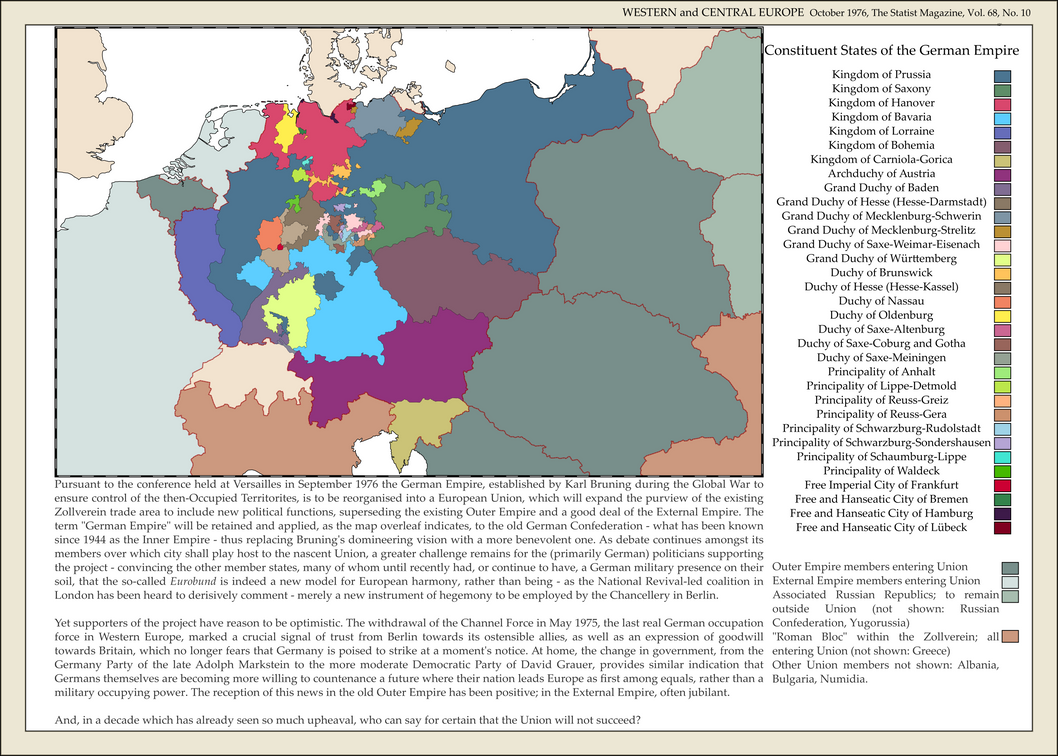Britain
Thirty years since the Global War ended in mutual exhaustion, Britain remains psychologically scarred; austerity has continued almost unabated as the cross-Channel relationship, often frosty and never more than coolly formal, has forced her to rely on the Empire for trade and wealth, a losing prospect as formal possession of the African and Asian colonies ended by dribs and drabs over the years.
This isn’t the stagflation and punk-rock Britain of OTL’s 1970s, though; far higher emigration rates, three-year conscription with practically no exemptions (conscientious objectors have a laundry list of reasons to emigrate), a far larger proportion of GNP dedicated to defence, and a chip on the shoulder which makes OTL Russia look contented makes the UK a considerably more militaristic state than IOTL (
inflation is still plenty of a problem, though). This has caused a certain degree of military adventurism, with frequent (and often hush-hush) participation in the brushfire wars around the German Empire’s periphery keeping the British Armed Forces lean, mean, and frighteningly competent.
This is reflected in domestic politics, with the ruling National Renewal Party reflective of the popular consensus. Somewhat like an OTL Popular Front, the NRP is authoritarian, pro-military, and dedicated to recouping the vision of the United Empire as a globe-spanning association of British and British-descended nations. They’re far from Designated Bad Guys, though; the NRP vision of the Renewed Empire is decidedly cosmopolitan, with room for people of other races and cultures –so long as they’re not German.
Since late 1966, when Mosely Leigh-Oswald’s National Renewal Party swept into power with a promise that, in his own words, “the British people will never again be bluffed out of certain victory” in the way the Whig-Tory coalition was perceived to have been, the NRP has maintained a solid majority, choosing to invite a few minor and similarly-minded parties into coalition to reshape Britain into the heart of the Renewed Empire. In doing so, they have had the wholehearted backing of King Henry X, who has nursed a furious hatred for the Germans since his mother perished in the air raid which destroyed Buckingham Palace during the Global War.
This single-minded determination has yielded mixed results. Things were on the up through to 1974, with the Scandinavians swinging towards Britain and a
marriage between the King of New Granada and Princess Sophia bolstering the British bloc. Even the Christmas Bomb offered Geoffrey Gold (who succeeded Leigh-Oswald after his assassination by Gerald K. Fitzjohn in 1971) a seemingly perfect opportunity to announce Britain’s re-emergence onto the world stage, by performing a rapid about-face on New Granada and spearheading the invasion of its erstwhile ally in early 1975, raising the curtain on the American War.
However, things have gone rather pear-shaped, even before the first
Limón boots hit the beach in Venezuela. Lennart
Skinner’s CNA flatly refused to support Britain in the invasion, with the
Caribbean members of the United Empire following suit and placing themselves under the CNA’s defence umbrella. What this has meant is that Britain is stuck doing the heavy lifting in a tropical quagmire; even the opening of a second front by the Australians and Taiwanese did little to relieve the pressure, and the
establishment of a puppet government in Venezuela has done little more than give Novogranadense guerrillas someone to focus on killing as
oil production has slumped to under a third of pre-war production.
An attempt by Gold to punish the Johnnies for their intransigence in the wake of the invasion of New Granada – including
aid shipments to the Novogranadense – by unilaterally appointing a new Viceroy (in violation of the Second Britannic Design, under which the North Americans had selected their own Viceregal candidate) backfired horrifically; faced with the de facto removal of their head of state by Britain’s efforts to use it as an instrument of control, the
North Americans simply did away with it in April this year, replacing the office of Viceroy with that of President. (In lesser, but still significant, news,
New Zealand voted by referendum to abolish the monarchy a few weeks before the North Americans).
Gold would be stunned if he had time to be; for now, the casualty totals from New Granada are enough to keep Whitehall occupied,
as Gold comes under fire even from within the NRP. Britain has caught a tiger by the tail, and now it’s stuck on the ride.

